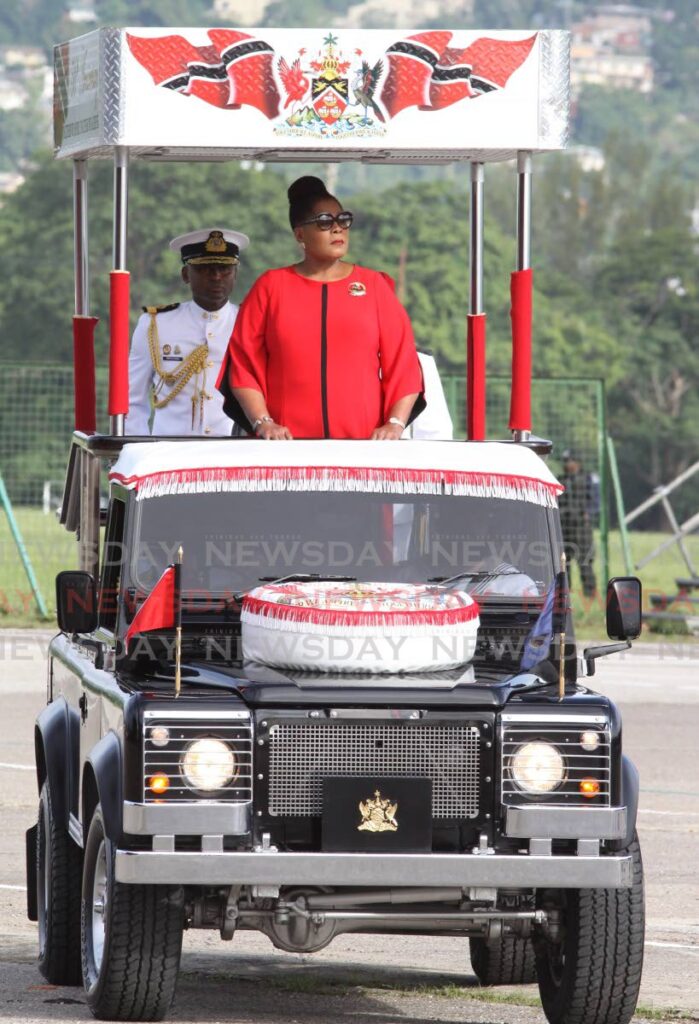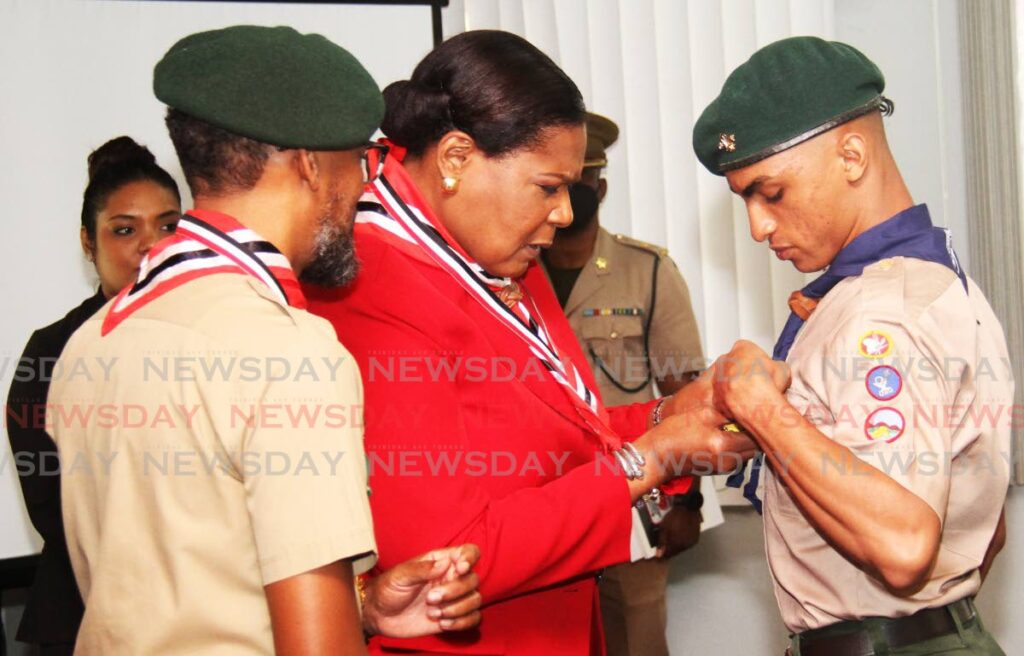No second term for Weekes: Electoral College to elect new President in January

A new President of TT is to be elected in January as the five-year term of President Paula-Mae Weekes comes to an end.
In a notice in the TT Gazette dated December 23, Speaker of the House of Representatives and chairman of the Electoral College, Bridgid Annisette-George said the Electoral College will convene on January 20, 2023, when a new President of TT will be elected.
“A person shall not be a candidate for election as President of the Republic of Trinidad and Tobago unless nominated for election by a nomination paper which (a) is signed by the candidate and by 12 or more Members of the House of Representatives; and (b) is delivered to the Speaker at least seven days before the election.”
Weekes, a retired Justice of Appeal in TT and The Turks and Caicos Islands, took office on 19 March, 2018 after being elected on January 19 of that year. As she was the only candidate nominated, she was deemed elected without the need for a vote and made history by becoming the first female President of TT.
She is the country’s sixth President after Ellis Emmanuel Innocent Clarke (September 24, 1976 – March 19, 1987), Noor Mohamed Hassanali (March 20, 1987 – March 17, 1997), Arthur Napoleon Raymond Robinson (March 18, 1997 – March 16, 2003), George Maxwell Richards (March 17, 2003 – March 18, 2013) and Justice Anthony Thomas Aquinas Carmona (March 19, 2013 – March 18, 2018).
Carmona and Robinson (deceased) served one term as President while Clarke (deceased), Hassanali (deceased) and Richards served two.
The President’s Office declined to make an official statement but suggested Weekes never intended to serve a second term.
Political analyst Dr Bishnu Ragoonath said the people would have to wait and see who the Government or the Opposition would nominate as President, but the selection was really down to who the Dr Keith Rowley administration nominated.
“The election of a President is usually done on the basis of the party which has the majority in the Upper and Lower House. Whoever the Prime Minister selects is who would win the majority because people vote along party lines. The Opposition could always nominate somebody but the chance of that person winning that election is a snowball’s chance in hell.”
He said the Government would probably look for someone who retired from the Judiciary, as had been the tradition, with the hope that person could operate with some degree of independence.

Commenting on Weekes term in office, he said people who were aware of the limitations of the position may say she did an “okay” job, while those who were not may believe she fell short.
“The President can only do so much in accordance with the Constitution and people don’t necessarily understand the limitations of the presidency compared with an executive Presidency like in the United States.
“Many people have called upon the President, on various occasions, to do things which fell outside her portfolio and purview. They may very well still feel upset believing she may not have done something.”
However, he said there were concerns about some of the things that happened during her term such as whether or not she received a housing allowance while continuing to live at her private home even though the President’s house was available to her, and her handling of the Police Service Commission (PSC) merit list issue.
On August 11, 2021, then PSC chairman, Bliss Seepersad, withdrew the Order of Merit List, which she delivered to the President, naming former commissioner of police Gary Griffith as the top nominee for the post from the President's office. She did so after a meeting with the PM at President's House, where Rowley said he gave her a document, the Barrington Report.
After Opposition Leader Kamla Persad-Bissessar filed a motion in the Parliament seeking to remove the President in October 2021, Weekes, in a paid advertisement, said there was no political interference or breach of the separation of powers, and she did not violate any provision of the Constitution nor was there any misbehaviour in public office on her part.
She said, “I confirm that an Order of Merit List in respect of the Commissioner of Police was delivered on August 11, 2021 to the OTP and withdrawn almost immediately thereafter that day.
“I therefore had no list from which a notification could issue. To date no other list has since been submitted. The OTP has been advised that the recruitment and selection process for the Office of Commissioner of Police has not yet been completed.”
Ragoonath said there was no legal explanation as to whether something that was submitted to the President could be withdrawn in that way, and it would always be a “black mark” on her term of office.
Another concern, he said, was her silence on various issues that affected the nation compared to previous Presidents, especially as people were looking forward to hearing more from the country’s first female President.
“While the President does not have any real role to play in the state of the nation and various issues such as crime, the economy and the insecurity of the people, there has been concern as to whether the President has been substantially silent and not empathising with the challenges of the citizens.”
Former commissioner of police and leader of the National Transformation Alliance Gary Griffith said it was unfortunate that Weekes would be remembered for “all the wrong reasons.”
He said she would especially be remembered for being “at the centre of the biggest controversy in a decade, when she refused to adhere to the laws of the country as she was mandated to do, by simply forwarding a merit list to Parliament after receiving it.”
Griffith said a President could do much to build and unite a country but, instead, she preached to, criticised and scolded citizens in almost every address, so he did not expect her to be remembered in a positive manner. He expressed the hope that whoever replaced her would operate in “a manner of statesmanship,” obey the law, and would not look down on those they served.
“Nevertheless, until the Constitution is radically changed, the post will remain one that is, or is perceived to be, totally political, and will continue to be seen as a rubber stamp post, as the President is appointed simply and solely by the decision of one man or woman, who is the Prime Minister at the time.
“He (the PM) chooses who he wants, upon which, he then orders his other MPs to vote as he directs. And as they have the majority, that is how the President is chosen, hence causing that individual to believe that they are beholden to the person who selected him/ her.”
Instead, he said it needed to be a post that could ensure checks and balances were in place to prevent anarchy.
United National Congress chairman Davendranath Tancoo, MP for Oropouche West, agreed with Ragoonath that the nominee of party in government was usually appointed as President. Therefore, he believed but did not expect that, in the interest of the nation, the PM should meet with the Opposition to discuss the selection of the President.
He said the country was in “economic and social free fall,” and needed a patriotic and independent person as President.
“We (the UNC) will be paying close attention to the nominees being presented and we will caucus as a party and decide our consensus position. We take our job and responsibility as guardians of our country's democracy, and have demonstrated that commitment even to the point of reversion to legal recourse. We simply do not trust this Prime Minister nor his Ministers or appointees to act in the best interest of our Country.”
Attempts to contact the PM, Opposition Leader Kamla Persad-Bissessar, and several MPs were unsuccessful.

Comments
"No second term for Weekes: Electoral College to elect new President in January"